Achievements Stem from Modest Acts of Leadership
In today's rapidly changing world, the traditional model of leadership is being redefined. Ordinary people, without formal training, are stepping up to become extraordinary leaders, demonstrating that leadership skills can be attainable by anyone who is willing to learn and practice.
One common trait of these leaders is practical and nurturing leadership. Pam Warhurst and Mary Clear, who led the "Incredible Edible" movement in the UK, showcased this style effectively. Their approach focused on collaboration and positive action, fostering a sense of shared ownership and pride among community members, and breaking down social barriers.
Another key aspect is the decentralization of ideas. The "Incredible Edible" movement deliberately avoided top-down structures, instead promoting an open-source idea that anyone could adopt and adapt locally. This approach has inspired over 150 groups across the UK, demonstrating the power of simple, well-communicated ideas to inspire widespread action.
Peer support and experience-based learning also play a significant role in leadership transformation. In a company transformation, leadership effectiveness was rebuilt by pairing experienced supervisors with those needing support. This peer support network was more effective than formal training programs, leading to increased trust in leadership and reduced turnover, with a cultural shift towards systemic problem-solving.
Successful initiatives today focus on creating conditions where ordinary people can excel in leadership roles, rather than developing superhuman leaders. This approach recognizes that sustainable leadership is not solely about individual talent but about the environment that supports leadership.
Extraordinary leaders are also characterized by their collaborative mindset, adaptability, empowerment, and visionary thinking. They work collaboratively, build strong relationships within their communities, adapt ideas and strategies to fit local contexts, empower others, and have a clear vision for change that inspires others to work towards it.
In summary, ordinary people become extraordinary leaders by leveraging practical, collaborative approaches, fostering supportive environments, and adapting to local needs. They often do so without formal training, relying on peer support, practical experience, and a focus on creating systemic solutions. This approach to leadership development may be the key to unlocking the leadership potential in everyone.
Developing extraordinary leadership in today's world involves fostering a collaborative mindset, empowering others, and adapting to local needs, often without formal training. Effective leaders, like those in the "Incredible Edible" movement, utilize practical, nurturing leadership styles to break down social barriers, promote shared ownership, and inspire widespread action. Leadership can be attainable for anyone who is willing to learn and practice, with peer support and experience-based learning playing significant roles in its transformation. A shift towards creating supportive environments that allow ordinary people to excel in leadership roles may be the key to unlocking the leadership potential in everyone, focusing on sustainable leadership through systemic problem-solving.




